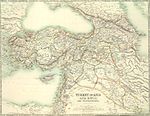Germiyanids
This article needs additional citations for verification. (September 2016) |
Germiyan | |||||||||
|---|---|---|---|---|---|---|---|---|---|
| 1300–1429 | |||||||||
Yaʿqūb II | |||||||||
| Historical era | Late Medieval | ||||||||
• Established | 1300 | ||||||||
• Disestablished | 1429 | ||||||||
| |||||||||
The Germiyanids (
Origins
According to Agoston and Masters Germiyanoğulları were
According to Middle East historian Petry, the Germiyans were a Turco-Kurdish dynasty.[6] However, cultural historian Cemal Kafadar states the ethnic makeup of the dynasty is too complex for a simple straightforward interpretation.[10]
History
For a brief period in the second half of the 14th century, Germiyan Dynasty was second only to
Germiyans played a crucial role in settling
They rebelled against the central power in 1283, upon the execution of the sultan
Their western offshoots that were the Beyliks of
Their strong political entity was eventually surrounded by newer states established by their own former commanders, leaving the Germiyan no outlet to the coastline or to Byzantine territory. Their powerful Karamanid neighbors exerting constant pressure from the east, Germiyan gradually fell under the rising influence of the Ottomans.

Legacy
The actual Turkish province of
The founding dynasty of the beylik produced illustrious descendants either under the
The
| History of Turkey |
|---|
 |
| Timeline |
|
|
References
- ISBN 9781878318046.
- ISBN 9781438410432.
- ISBN 978-0-8143-1540-8, The Germiyan were probably Kurdish and Turkish half-breeds who came from east of Malatya.
- ISBN 0-582-49303-X, 9780582493032 The second of the eastern principalities, Germiyan, developed from a group, probably of mixed Kurdish and Turkish origin
- ISBN 978-0-89241-430-7, Near Byzantine borders in Phrygia, the emirate of Germiyan was formed by a mixed population of Turks and Kurds, who had come from east of Malatya
- ^ ISBN 978-0-521-63313-0, An Anatolian Turco-Kurdish dynasty, with its capital at Kutahya
- ISBN 978-1-85649-018-4.
- ISBN 978-0-8160-6259-1
- ^ a b Mehmet Fuat Köprülü, (1937), The Origins of the Ottoman Empire, p. 37
- ^ Kafadar 2007, p. 22.
- ^ Shaw, Stanford J. History of the Ottoman Empire and Modern Turkey: Volume 1, Empire of the Gazis: The Rise and Decline of the Ottoman Empire 1280-1808. Cambridge University Press. p. 21.
- ^ Sadettin Buluç (1969). "Eski Anadolu Türkçesiyle Bir Kabus-name Çevirisi". Belleten (in Turkish). Turkish Language Association. p. 195.
Bibliography
- Bosworth, Clifford Edmund (1996). New Islamic Dynasties: A Chronological and Genealogical Manual. Edinburgh University Press.
- Kafadar, Cemal (2007). "A Rome of One's Own: Reflections on Cultural Geography and Identity in the Lands of Rum". Muqarnas. 24. Brill: 7–25.
- (limited preview) ISBN 0-7914-0819-1.
- Varlık, Mustafa Çetin (1996). "Germiyanoğulları". TDV Encyclopedia of Islam, Vol. 14 (Geli̇bolu – Haddesenâ) (in Turkish). Istanbul: ISBN 978-975-389-441-8.
